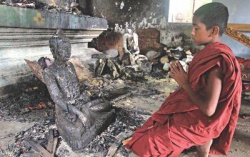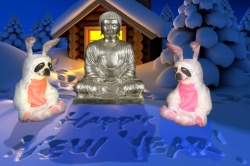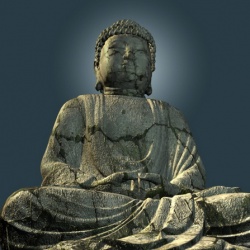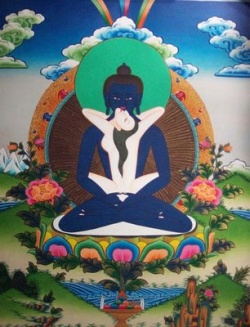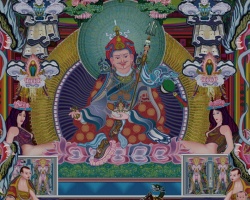In Defense of Buddhism: The Disposition of Error (c. 5th Century CE)
In Defense of Buddhism
The Disposition of Error (c. 5th Century BCE)
from P .T. Welty, The Asians: Their Heritage and Their Destiny, (New York" HarperCollins, 1953, 1976), repr. in Kevin Reilly, Readings in World Civilizations, Vol 1, 2d. ed., (New York: St. Martin's Press, 1994), pp. 165-70
[Reilly Introduction] The Disposition of Error appears to be a defense of Buddhism written to refute some of the charges against the new religion from India by Confucian and other Chinese. While the author and date of composition are uncertain, we know that this kind of tract was common in China under the Southern Dynasties (420-589 CE).
What kind of objections to Buddhism did Chinese Confucians have? How did the Buddhists answer these objections? Was Buddhism fundamentally "un-Chinese"?
WHY IS BUDDHISM NOT MENTIONED IN THE CHINESE CLASSICS?
The questioner said: If the way of the Buddha is the greatest and most venerable of ways, why did Yao, Shun, the Duke of Chou, and Confucius not practice it? In the seven Classics one sees no mention of it. You, sir are fond of the Book of Odes and the Book of History, and you take please in rites and music. Why, then, do you love the way of the Buddha and rejoice in outlandish arts? Can they exceed the Classics and commentaries and beautify the accomplishments of the sages? Permit me the liberty, sir, of advising you to reject them.
Mou Tzu a Chinese Buddhist) said: All written works need not necessarily be the words of Confucius, and all medicine does not necessarily consist of the words of the formulae of [the famous physician] P'ien-ch'ueh. What accords with principle is to be followed, what heals the sick is good. The gentleman-scholar draws widely on a1 forms of good, and thereby benefits his character. Tzu kung [a disciple of Confucius] said, "Did the Master have a permanent teacher?' Yao served Yin Shou, Shun served Wu-ch'eng, the Duke of Chou learned from L� Wang, and Confucius learned from Lao Tzu. And none of these teachers is mentioned in the seven Classics. Although these four teachers were sages, to compare them to the Buddha would be like comparing a white deer to a unicorn, or a swallow to a phoenix. Yao Shun, the Duke of Chou, and Confucius learned even from such teachers as these. How much less, then, may one reject the Buddha, whose distinguishing marks are extraordinary and whose superhuman powers know no bounds! How may one reject him and refuse to learn from him? The records and teachings of the Five Classics do not contain everything. Even if the Buddha is not mentioned in them, what occasion is there for suspicion?
WHY DO BUDDHIST MONKS DO INJURY TO THEIR BODIES?
The questioner said: The Classic of Filial Piety says 'Our torso, limbs, hair, and skin we receive from our fathers and mothers. We dare not to do them injury." When Tseng Tzu was about to die, he bared his hands and feet But now the monks shave their heads. How this violates the sayings of the sages and is out of' keeping with the way of the filially pious!... Mou Tzu said:... Confucius has said, "He with whom one may follow a course is not necessarily he with whom one may weigh its merits." This is what is meant by doing what is best at the time. Furthermore, the Classic of Filial Piety says, "The kings of yore possessed the ultimate virtue and the essential Way." T'ai-po cut his hair short and tattooed his body thus following of his own accord the customs of Wu and Y�eh and going against the spirit of the "torso, limbs, hair, and skin" passage. And yet Confucius praised him, saying that his might well be called the ultimate virtue.
WHY DO MONKS NOT MARRY?
The questioner said: Now of felicities there is none greater than the continuation of one's line, of unfilial conduct there is none worse than childlessness. The monks forsake wife and children, reject property and wealth. Some do not marry all their lives. How opposed this conduct is to felicity and filial piety!...
Mou Tzu said: ...Wives, children, and property are the luxuries of the world, but simple living and inaction are the wonders of the Way. Lao T'zu has said, "Of reputation and life, which is dearer? Of life and property, which is worth more?"...Hs�i Yu and Ch'ao-fu dwelt in a tree. Po I and Shu Sh'i starved in Shou-yang, but Confucius praised their worth, saying, "They sought to act in accordance with humanity and they succeeded in acting so," One does not hear of their being ill-spoken of because they were childless and propertyless. The monk practices the Way and substitutes that for the pleasures of disporting himself in the world. He accumulates goodness and wisdom in exchange for the joys of wife and children.
DEATH AND REBIRTH
The questioner said: The Buddhists say that after a man dies he will be reborn. I do not believe in the truth of these words....
Mou Tzu said: ... The spirit never perishes. Only the body decays. The body is like the roots and leaves of the five grains, the spirit is like the seeds and kernels of the five grains. When the roots and leaves come forth they inevitably die. But do the seeds and kernels perish? Only the body of one who has achieved the Way perishes....
Someone said; If one follows the Way one dies. If one does not follow the Way one dies. What difference is there?
Mou Tzu said: You are the sort of person who, having not a single day of goodness, yet seeks a lifetime of fame. If one has the Way, even if one dies one's soul goes to an abode of happiness. If one does not have the Way, when one is dead one's soul suffers misfortune.
WHY SHOULD A CHINESE ALLOW HIMSELF TO BE INFLUENCED BY INDIAN WAYS?
The questioner said: Confucius said, "The barbarians with a ruler are not so good as the Chinese without. one." Mencius criticized Ch'en Hsiang for rejecting his own education to adopt the ways of [the foreign teacher) Hs� Hsing, saying, "I have heard of using what is Chinese to change what is barbarian, but I have never heard of using what is barbarian to change what is Chinese." You, sir, at the age of twenty learned the way of Yao, Shun, Confucius, and the Duke of Chou. But now you have rejected them, and instead have taken up the arts of the barbarians. Is this not a great error?
Mou Tzu said: ...What Confucius said was meant to rectify the way of the world, and what Mencius said was meant to deplore one-sidedness. Of old, when Confucius was thinking of taking residence among the nine barbarian nations, he said, "If a gentleman-scholar dwells in their midst, what baseness can there be among them?'....The Commentary says, "The north polar star is in the center of heaven and to the north of man." From this one can see that the land of China is not necessarily situated under the center of heaven. According to the Buddhist scriptures, above, below, and all around, all beings containing blood belong to the Buddha-clan. Therefore I revere and study these scriptures. Why should I reject the Way of Yao, Shun, Confucius, and the Duke of Chou? Gold and jade do not harm each other, crystal and amber do not cheapen each other. You say that another is in error when it is you yourself who err.
WHY MUST A MONK RENOUNCE WORLDLY PLEASURES?
The questioner said: Of those who live in the world, there is none who not love wealth and position and hate poverty and baseness, none who does not enjoy pleasure and idleness and shrink from labor and fatigue.... But now the monks wear red cloth, they eat one meal a day, they bottle up the six emotions, and thus they live out their lives. What value is there in such an existence?
Mou Tzu said: Wealth and rank are what man desires, but if he cannot obtain them in a moral way, he should not enjoy them. Poverty and meanness are what man hates, but if he can only avoid them by departing from the Way, he should not avoid them. Lao Tzu has said, "The five colors make men's eyes blind, the five sounds make men's ears deaf, the five flavors dull the palate, chasing about and hunting make men's minds mad, possessions difficult to acquire bring men's conduct to an impasse. The sage acts for his belly, not for his eyes." Can these words possibly be vain? Liu-hsia Hui would not exchange his way of life for the rank of the three highest princes of the realm. Tuan-kan Mu would not exchange his for the wealth of Prince Wen of Wei.... All of them followed their ideals, and cared for nothing more. Is there no value in such an existence?
WHY DOES MOU TZU SUPPORT HIS CONTENTIONS FROM SECULAR RATHER THAN BUDDHIST LITERATURE?
The questioner said: You, sir, say that the scriptures are like the rivers and the sea, their phrases like brocade and embroidery. Why, then, do you not draw on the Buddhist scriptures to answer my question? Why instead do you refer to the books of Odes and History, joining together things that are different to make them appear the same?
Mou Tzu said: ... I have quoted those things, sir, which I knew you would understand. Had I preached the words of the Buddhist scriptures or discussed the essence of non-action, it would have been like speaking to a blind man of the five colors or playing the five sounds to a deaf man.
